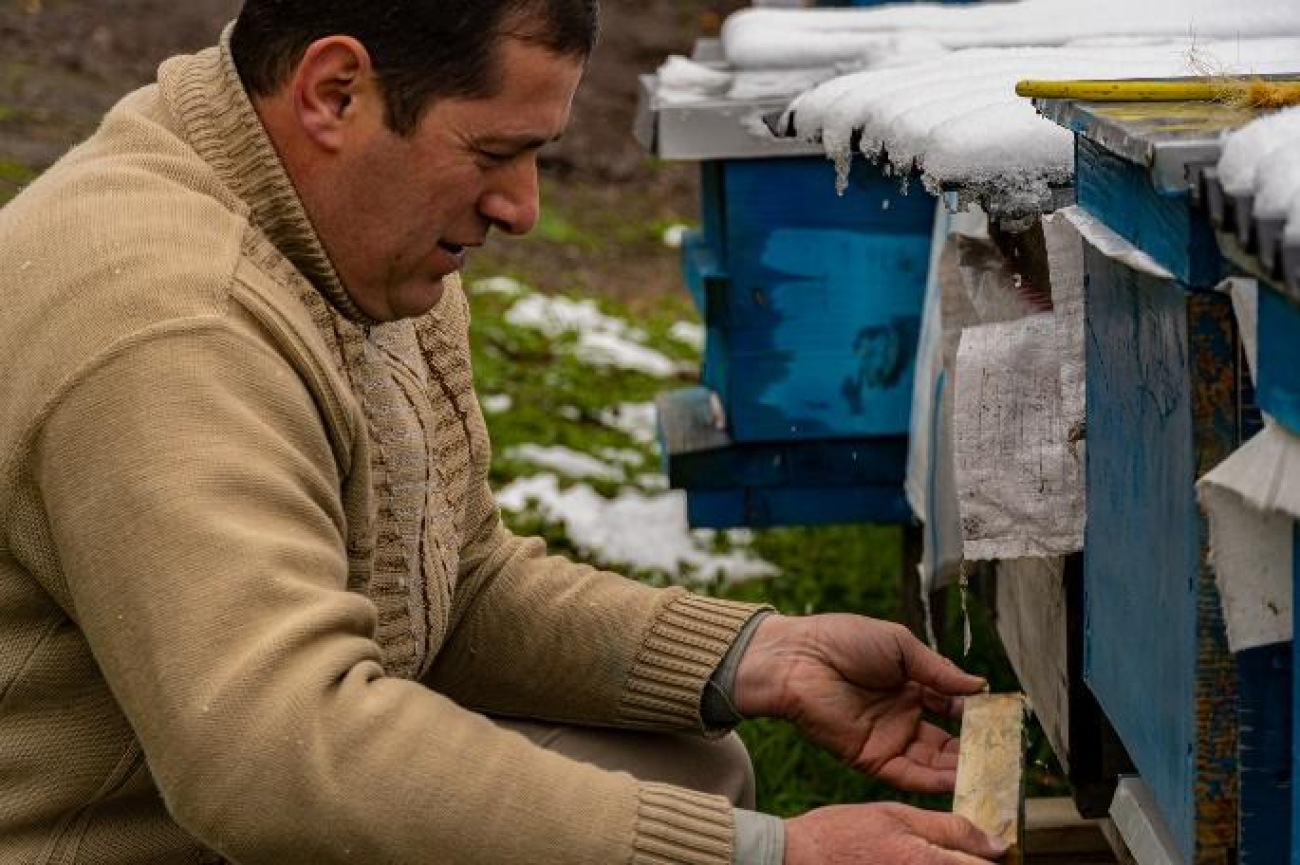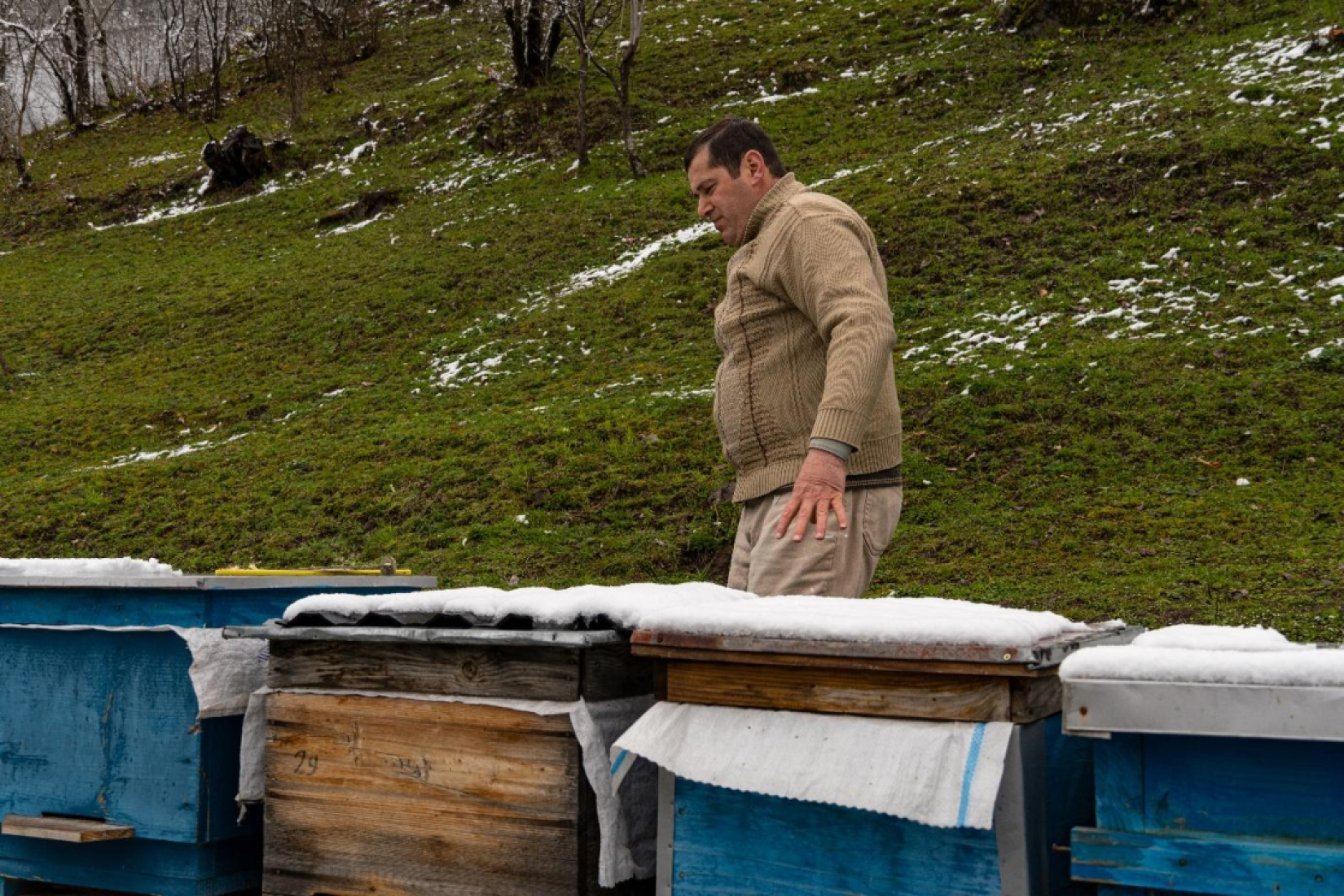Building beehives, practising safe food production, establishing connections

FAO and the EU, under ENPARD and EU4Business Programmes, have supported Zebur and his family in expanding their beekeeping efforts.
The misty mountains of Adjara overlook a quiet, green gorge in the tree-filled Khulo, where Zebur Iakobadze’s electric saws are buzzing as he cuts fir planks for his wooden beehives. Following in his ancestors’ footsteps, as a practising Muslim, Zebur proudly represents a religious minority group and keeps the beekeeping traditions alive in his remote village. His family directly produces honey and cares for bees in their backyard in handcrafted beehives. Zebur’s spouse, father, and son are all involved in the day-to-day activities.
FAO and the EU, under ENPARD and EU4Business Programmes, have supported Zebur and his family in expanding their beekeeping efforts with a targeted matching grant, pieces of training, and a platform for connecting with customers and businesses.
With limited financial resources and access to modern woodworking technologies, Zebur found it impossible to increase the number of bee families. When he started with two beehives, it was very costly for him to purchase new ones. “Because I did not have the money,” he says, “I had to build them myself, but it took too long. My bees flew away at that time.” Zebur did not have advanced woodworking equipment at hand. It took him two-three days to build one beehive in his barn, which is now transformed into a small workshop.
At some stage, Zebur even purchased a few beehives. He realised that this did not make much sense to him financially due to the amount of money he had to spend on buying and transporting those from Batumi. So, Zebur had a business problem to solve and started looking for opportunities to do so. Building beehives himself seemed to be the best solution to growing his beekeeping efforts; however, he needed to find ways of accessing modern woodworking equipment.
During his search for solutions, Zebur learned about the matching grants FAO was giving out to farmers through the European Union (EU) support. Like 350 other farmers in Georgia, he won a grant and purchased modern woodworking equipment.
Hence, Zebur was finally able to fill the gap in the value chain and give use to the timbres lying idly in the corners of his barn. The newly purchased saws started rolling, cutting up planks to make brand-new, handcrafted beehives.
Now, Zebur proudly walks around the beehives which he created. They are placed in his garden that bursts into a colourful exposition of flowers, buds, and thickets during Spring and becomes a soothingly monochromatic, snow-covered landscape in Winter. The beehives always need to be adjusted and cleaned, and he and his family members diligently do so.
Zebur’s 18-year-old son, Ucha, is always assisting in constructing and repairing beehives. His father often takes up the duties of cleaning beehives and managing their frames. Moreover, Zebur’s spouse usually takes on harvesting honey and storing and branding the jars.
Zebur and his family have already built around 150 beehives and sold nearly 100 to neighbouring beekeepers. The peaceful village in Khulo has hence been enriched with the sounds and echoes of whirring saws and the buzzing of ever-increasing bees.
“FAO and the EU’s support has helped me save time,” says Zebur, “when building beehives by hand, producing one beehive took me two-three days, and now, with the new equipment, the process only takes up to four hours. This efficiency increased the number of bees – once I had the beehives, I also grew the number of bee families. When I grew the bees, I started producing natural honey.”
Indeed, the increased production of honey, bolstered by the added woodworking capacity, has created room for Zebur and his family to consider integrating food safety concepts into their work. The knowledge and experience he obtained through the EU-supported FAO training sessions on food safety have also been helpful in this. This is where he learned the best production practices that ensure higher-quality, safer agricultural products.
Beyond food safety, the educational modules of FAO and the EU have also taught Zebur about marketing, business management, and sales. Afterwards, he, like nearly 70 other Georgian producers of niche and terroir goods, was provided with a platform for connecting with businesses and customers.
FAO and the EU have organised the Unique Georgian Taste farmers’ market series of FAO and the EU in Georgia’s cities – Tbilisi, Kutaisi, and Mestia. The knowledge that Zebur and others gained during the training has been instrumental in communicating with customers and representatives of retail and HoReCa sectors, all of whom have been actively visiting the Unique Georgian Taste farmers’ markets. Zebur has also started working with retailers in Batumi and selling his family’s honey in the capital of Adjara.
“I have been at the farmers’ markets many times in Tbilisi, as well as in Kutaisi, and the awareness [about my products] has increased,” Zebur points out and adds that “sales have also considerably increased, along with the awareness. After the farmers’ markets, I would receive calls from customers who tasted my honey during the events and requested me to send more honey to them.”
Zebur and his family’s honey is now stored in transparent glass jars that brighten spaces with pale orange light. They are sealed, branded, and constantly transported from his family’s village to customers and stores. Together with his family, Zebur keeps expanding the production of beehives and honey. On the first floor of his house, he plans to finalise the refurbishment of a bigger storage space for honey while also increasing the woodworking capacity in his workshop.
FAO and the EU support small, medium and large farming initiatives under the ENPARD and EU4Business Programmes. The EU4Business EU Innovative Action for Private Sector Competitiveness in Georgia aims to assist Georgian entrepreneurs in improving the legal environment and access to finance while strengthening ties with the European Union. The ENPARD Programme of the EU, aiming to reduce rural poverty, has been implemented since 2013. The Programme started by supporting the development of the agriculture sector and cooperatives. Afterwards, it concentrated also on creating economic opportunities for rural populations in Georgia. Since 2022, the Programme has placed an even more significant emphasis on improving food safety in the country.





